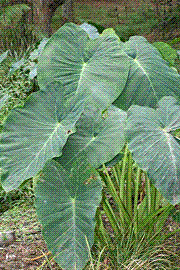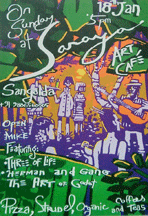Pathrades are made from these leaves. 
In North India, it is called Arvi or Arbi. In Assamese it is called Kosu. In Bengali the root is called gath and the plant is called Kochu. It is a very common dish and may be served with or without gravy. The leaves are rolled along with gram flour batter and then fried or steamed to make a dish called Patode which is finshed by tempering with red chiilies and carrom seeds.
A tree-growing variety of taro is extensively used in the western coast of India to make patrade or patrada, literally "leaf-pancake". These are either made like fritters, or are steamed and eaten. In the state of Maharashtra, it is called Alu in Marathi. The leaves, called 'Alu che Paana', are de-veined, rolled with a paste of gram flour, tamarind paste, red chilli powder, turmeric, coriander, asoefotida, salt and steamed. These can be cut into pieces, eaten as such or shallow fried and eaten as a snack known as alu chi wadi. 'Alu chya panan chi patal bhaji', a lentil and colocasia leaves curry is also popular. In the Indian state of Gujarat it is used to make patra, a dish with the leaves of the plant prepared with tamarind and other spices. Sindhis call it 'Kachaloo'; They fry it, smash it and re-fry it to make a dish called 'Took' which compliments Sindhi Curry.
In Kerala, a state in southern India, taro corms are known as Chembu-kizhangu. It is used as a staple food, as a side dish, or as a component in various side dishes. As a staple food it is steamed, and eaten with a chutney of green pepper and shallot onions. The leaves and stems of certain varieties of taro are used as a vegetable in Kerala.
In other Indian states, Tamil Nadu & Andhra Pradesh, taro corms are known as Sivapan-kizhangu 'chamagadda' or in coastal Andhra districts as 'Chaama dumpa' in Telugu, and can be cooked in many ways, deep fried in oil for a side item with rice, or cooked in a tangy tamarind sauce with spices, onion and tomato.
In Dakshin Kannada district in the state of Karnataka, Taro is used in morning breakfast dish as Patrode.
In the Indian state of Uttarakhand and neighbouring Nepal, it is considered a health food with a variety of cooking styles. The most common style is boiling it in salty water in iron cooking pots until it becomes like porridge. Another style is to steam the young leaves called 'gava', sun-dry and then store it for later use. For another variety, the taro leaves and stems are used raw as an ingredient for pickles. The leaves and stems are mixed with black lentils and then dried as small balls called badi and used later on. The stems are also sun-dried and stored for later use. On one special day, women worship saptarshi (seven sages) and have rice with taro leaf vegetable only.
Care must be taken to oil one's hands before handling the leaves, as some leaves are acidic and cause scratching. The leaves are completely safe and delicious after cooking.
Chembu Ilai Appam
Chembu in Malayalam is
Colcassia leaves, i.e. allu leaves used for making Patrade recipes, which you
can find on this website, in Mangalore/Goa - Vegetables.
Nepal
Taro is grown in the hilly regions of Nepal. The root of Taro is known as Pindalu. The stem and leaves are known as Karlako.
| < Prev | Next > |
|---|
















